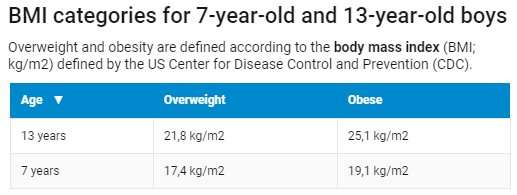Weight loss can protect overweight boys from developing type 2 diabetes

A new study shows that overweight seven year olds have a higher risk of developing type 2 diabetes as adults, but only if they are still overweight by the time they hit puberty and beyond.
It's well known that overweight in childhood leads to an increased risk of type 2 diabetes later in life. Our research has previously shown that children who weigh just a couple of kilograms too much have a much higher chance of developing the disease, and that this effect is more pronounced in girls than boys.
But in this study we didn't have information from adults, for which we received some criticism, for exclusively studying child and not adult body mass indices (BMIs). This meant that we couldn't judge whether weight loss before adulthood could help to reduce the risk of developing diabetes later in life.
Other studies were too small to shed any light on the matter. So, together with Associate Professor Jennifer L. Baker among other colleagues, I revisited the issue in a new study.
Largest study of its kind
We analysed data from 62,565 men recorded in school health records (at the age of seven and thirteen years) and conscription examination records (medical records of young Danish men called up for national service) between the ages of 17 to 26.
Men born between 1939 and 1959 were tracked via the National patient register. We identified 6,710 men (approximately 10 per cent), who went on to develop type 2 diabetes.
The study is the largest of its kind anywhere in the world and it is published in the New England Journal of Medicine.
Reduces the risk for type 2 diabetes
As reported in previous studies, we found an increased risk for type 2 diabetes in adulthood among boys who had overweight (here we use the term overweight to describe the disease, in the same way we use 'type 2 diabetes') at age seven, thirteen, and older.
In our study, we showed that losing weight before reaching early adulthood subsequently reduced the risk of developing type 2 diabetes later on. Specifically, boys with overweight had the same risk of developing type 2 diabetes later in life (between the ages of 30 and 60) as boys of a normal weight, provided they reduced their BMI before puberty and maintained that weight loss until early adulthood.
Boys were only more likely to develop type 2 diabetes as adults if the overweight remained by the time they reached puberty and beyond.
We also saw that severely overweight seven and thirteen year old boys benefit from reducing their BMI before they reach puberty. They cannot completely eliminate the risk, but they can reduce it significantly.
Overweight thirteen-year-olds at higher risk
You can see example BMIs for each age group in the table below.

Let's take two examples as an illustration:
- A boy aged seven weighs 23 kilograms and measures 1.22 metres tall. If we divide his weight by his height (23/1.22) we can calculate his BMI: 15.4 kilograms per square metre. He has a normal weight.
- A boy aged seven, weighs 28 kilograms and is 1.22 metres tall. He has a BMI of 18.8 kilograms per square metre. He is overweight.
Men who were overweight in all age groups (seven, thirteen, and early adulthood) were four times more likely to develop type 2 diabetes between the age of 30 and 60, and this risk was the same for men who were of a normal weight at seven but had become overweight by the age of thirteen and after, compared with men who were normal weight at all ages.
For men who had only put on weight by the time they hit early adulthood, the risk was three times higher.
Even small changes in BMI count
Reducing BMI between the age of seven and eighteen was associated with a reduced risk of developing type 2 diabetes.
Even boys with obesity could halve their risk by reducing their BMI from 'obesity' to 'overweight,' and they could remove the elevated risk entirely by bringing their BMI down to a normal level.
In contrast, every single increase in BMI was associated with an increased risk of type 2 diabetes.
In general, there was an increased risk of type 2 diabetes among less educated eighteen-year-olds. But this could not explain the increased risk observed in men with overweight. And regardless of educational level, they could all reduce their risk of developing type 2 diabetes by losing weight before puberty.
We need to prioritise prevention of overweight in children
All in all, our results show that overweight around the age of puberty indicates a pattern of weight gain, which is particularly significant for the risk of developing type 2 diabetes.
Today, as many as 20 per cent of children are overweight. Our results suggest that preventing and treating overweight in prepubescent teenagers can help to reduce their risk of developing type 2 diabetes later on.
These are encouraging results.
Research among girls is now needed
The next stage is to study whether women experience the same beneficial results by reducing their BMI before puberty, and whether the benefits also apply to other weight-related conditions such as heart disease and stroke.
And we also need to find out whether losing weight in adulthood carries the same benefits.
Other studies show that weight loss in adulthood delays the development of type 2 diabetes. Therefore, we expect that weight loss at any time from childhood to adulthood has the same beneficial effect.
More information: Lise G. Bjerregaard et al. Change in Overweight from Childhood to Early Adulthood and Risk of Type 2 Diabetes, New England Journal of Medicine (2018). DOI: 10.1056/NEJMoa1713231 A. Llewellyn et al. Childhood obesity as a predictor of morbidity in adulthood: a systematic review and meta-analysis, Obesity Reviews (2015). DOI: 10.1111/obr.12316
This story is republished courtesy of ScienceNordic, the trusted source for English-language science news from the Nordic countries. Read the original story here.


















